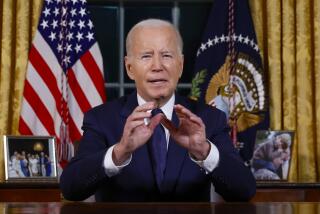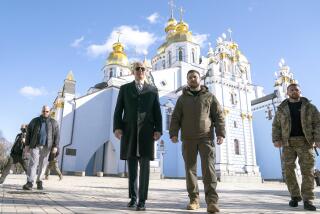NEWS ANALYSIS : Bosnia Role Offers Clinton Risk, Little Gain
- Share via
WASHINGTON — While details of the new U.S. policy on Bosnia-Herzegovina remain hazy, its domestic political effects are all too clear: Any expanded U.S. military role there poses grave risks and little potential gain for President Clinton.
The possible benefits are limited because the Bosnian combat--postwar Europe’s bloodiest conflict--has failed to capture the attention of Americans, even after three years.
And unhappily for Clinton, it is only likely to seem important, pollsters and other experts say, if the deployment of U.S. troops produces casualties--and turns an increasingly anti-interventionist public decisively against the President’s latest Bosnian strategy.
By a similar logic, the GOP presidential contender who may stand to gain the most from the issue initially is the one who has been most stridently opposed to the U.S. entanglement in the Balkans: If U.S. soldiers die in Bosnia, commentator Patrick J. Buchanan, the most isolationist candidate in the field, “could ride this horse all the way to Iowa,” said Stuart Rothenberg, a publisher of the nonpartisan Rothenberg Political Report.
As the Administration this week began sketching out its new willingness to have U.S. ground troops help move U.N. peacekeepers to safer positions, White House aides pointed to polls showing that, while Americans are leery of a U.S. commitment in the Balkans, they also want justice for a land where 200,000 have been killed.
Yet some people close to Clinton acknowledged that even the best outcome would probably yield scant political benefit for the President.
One White House aide portrayed Clinton’s decision as a gamble. It is compelled by the need to increase stability in one of the world’s dangerous corners and to safeguard the credibility of the North Atlantic Treaty Organization.
The political upside is probably “zero,” this aide said.
He added that, while bold moves can give a political boost by making a President look strong, such a benefit comes only with a clear-cut outcome--which is highly unlikely in the morass of the Bosnian war.
*
Geoffrey Garin, a Democratic pollster and regular adviser to Clinton, said the Bosnian policy may not have much impact on Clinton either way, provided the Administration can avoid a catastrophe.
“Remarkably few people in the electorate today use foreign policy as a measuring rod,” Garin said. And in the case of Bosnia, “there’s no indication that people have been following the issue very closely at all.”
Pollsters say foreign policy issues have generally ranked low on voters’ lists of top concerns in recent years. Foreign affairs worries have not topped such lists since 1968, at the height of the Vietnam War.
And as foreign policy issues have declined in urgency with the end of the Cold War, Americans’ willingness to support military intervention has all but disappeared.
John Mueller, a political scientist and specialist on foreign policy at the University of Rochester in New York, cited his proof of this: the 1992 humanitarian mission to starving Somalia. The U.S. military helped save tens of thousands from famine, yet when 18 Army troops died in a battle with a warlord’s militia in Mogadishu, the public demanded that U.S. forces be withdrawn from the embattled African nation.
“If the public believes that this huge accomplishment was not worth those 18 lives, it’s unlikely they’d put up with losses mucking around in Bosnia, where they’re not likely to make much difference,” Mueller said.
Clinton’s intervention in Haiti to restore a democratically elected government, now judged a success after wide initial skepticism, has done little for Clinton politically, he noted.
But even if voters have not been paying much attention to Bosnia, Clinton’s announcement has opened him up to a barrage of criticism from prominent members of his own party, as well as from Republicans.
Sen. Claiborne Pell (D-R.I.), ranking Democrat on the Senate Foreign Relations Committee, and Rep. Lee H. Hamilton (D-Ind.), ranking Democrat on the House International Relations Committee, have both said they were reluctant to have Americans take part in a risky mission.
Clinton’s manner of rolling out the new policy has also drawn criticism, even from party allies. Hamilton, for example, complained that he was not fully consulted and that Clinton had not adequately laid out a rationale for the new policy to the public.
*
Privately, some congressional Democrats said they believed that Clinton would soon be looking for a way to avoid putting U.S. soldiers at risk, except to evacuate U.N. peacekeepers or to monitor a peace agreement.
One House Democrat said he “respected” Clinton’s decision.
But, noting Clinton’s long record of shying away from risky involvement in Bosnia, he said: “I can’t believe he’s not looking for the exit.”
This House member said Clinton would suffer politically if he appeared to back down now. But, he said, the political damage could be far greater if there are U.S. casualties.
Among Republican presidential candidates, a crisis over Bosnia would tend to help candidates with foreign policy experience, by contrasting their resumes with Clinton’s apparent fumbling: Sen. Richard G. Lugar (R-Ind.), chairman of the Senate Foreign Relations Committee, and Senate Majority Leader Bob Dole (R-Kan.) would each be expected to get some boost.
Dole has argued that the current peacekeeping effort should be shut down and replaced with a lifting of the arms embargo against the Muslim-led Bosnian government, a view shared by many Republicans.
Lugar maintains that NATO should organize a big force, perhaps 100,000 soldiers, to quickly force a peace settlement.
But in a deepened crisis with U.S. casualties, the biggest boost from the issue could come to Buchanan for his arguments that the United States should have had nothing to do with the civil war.
More to Read
Get the L.A. Times Politics newsletter
Deeply reported insights into legislation, politics and policy from Sacramento, Washington and beyond. In your inbox twice per week.
You may occasionally receive promotional content from the Los Angeles Times.











